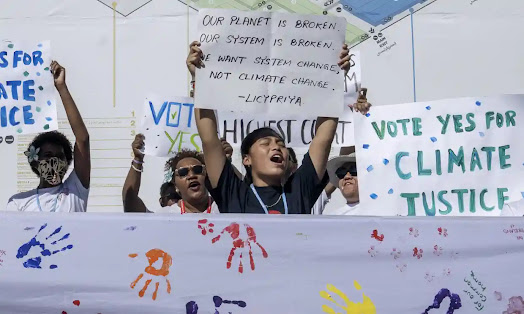Resolution asks ICJ to clarify countries’ obligations to fight climate change and the consequences they should face for inaction
A group of Pacific Island students who were instrumental in pushing a UN resolution that should make it easier to hold polluting countries legally accountable for failure to act on the climate crisis have greeted its adoption as historic.
“Young people across the world will recall the day when we were able to get the world’s highest court, the international court of justice, to bring its voice to the climate justice fight,” said Solomon Yeo, campaign director of Pacific Islands Students Fighting Climate Change (PISFCC), who is from Solomon Islands.
The resolution calls for the international court of justice (ICJ) to issue an opinion clarifying nations’ obligations to tackle the climate crisis and the consequences they should face for inaction.
“I don’t want to show a picture to my child one day of my island. I want my child to be able to experience the same environment and the same culture that I grew up in,” said Cynthia Houniuhi, also of Solomon Islands and who is president of PISFCC. “The environment that sustains us is disintegrating before our eyes.”
Frustrated by the world’s lack of action on climate change, law students in eight Pacific island nations founded PISFCC in 2019 and launched their campaign to persuade their leaders to take the resolution to the UN’s highest court.
Spearheaded by Vanuatu, Pacific nations soon took up the law students’ call.
Pacific Island nations are at risk of rising seas engulfing swathes of the islands. Scientists say both extreme weather and sea levels have worsened because of climate change caused by the burning of fossil fuels. The resolution asks the court to pay particular attention to the harm endured by small island states.
Vanuatu Prime Minister Ishmael Kalsakau greeted the resolution as “a win for climate justice of epic proportions.”
“Today’s historic resolution is the beginning of a new era in multilateral climate cooperation, one that is more fully focused on upholding the rule of international law and an era that places human rights and intergenerational equity at the forefront of climate decision-making,” he said.
UN secretary general António Guterres said he hoped the opinion, when issued, would encourage nations “to take the bolder and stronger climate action that our world so desperately needs”.
While the opinion from the ICJ will not be binding, it will encourage states “to actually go back and look at what they haven’t been doing and what they need to do” to address the climate emergency, said Nilufer Oral, director at the Center for International Law at the University of Singapore.
The court has other power it can bring to bear, Christopher Bartlett, climate diplomacy manager for the government of Vanuatu, explained. The court can reference other international legal instruments, such as the International Covenant on Civil and Political Rights and United Nations Convention on the Rights of the Child, and those do have the force of law for the countries that have ratified them.
“The international court of justice is the only legal authority that has a mandate to look at all of international law. While the advisory opinion itself is not binding, the laws upon which the advisory opinion will be speaking absolutely are legally binding and immediately applicable to states,” said Bartlett.
Bartlett said that some of the questions the ICJ will ask include: what harm to the climate has been done? Should states be forced to take certain actions? And is financial support a legal consequence of causing harm?
The resolution now goes to the court.
Countries have agreed to aim to limit warming to 1.5 degrees Celsius with an upper limit of 2 degrees Celsius back in 2015 as part of the Paris Agreement. The agreement asks countries to submit their plans to curb greenhouse gases to the UN and regularly revise and update those plans.
Clarifying those obligations for states, as well as other promises to protect biodiversity and strengthen domestic policies are the main aims of the advisory opinion, said Ralph Regenvanu, Vanuatu’s climate change minister.
“We are also clear eyed that existing international frameworks have significant gaps,” he said, adding that the opinion could push for stronger legal measures like negotiating a fossil fuel non-proliferation treaty or criminalising “climate destroying activities”. lionaire owner, meaning we can fearlessly chase the truth and report it with integrity. 2023 will be no different; we will work with trademark determination and passion to bring you journalism that’s always free from commercial or political interference. No one edits our editor or diverts our attention from what’s most important.
With your support, we’ll continue to keep Guardian journalism open and free for everyone to read. When access to information is made equal, greater numbers of people can understand global events and their impact on people and communities. Together, we can demand better from the powerful and fight for democracy.











Post A Comment:
0 comments: